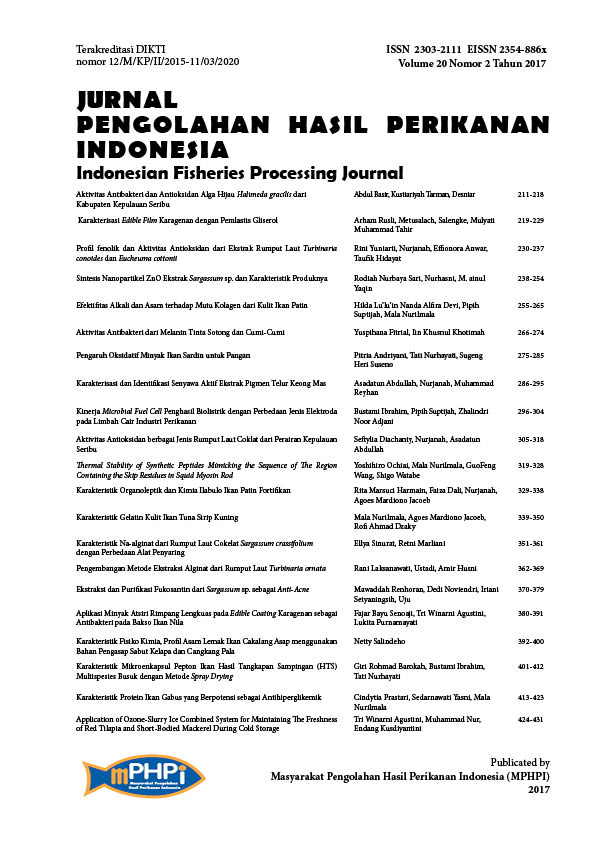THERMAL STABILITY OF SYNTHETIC PEPTIDES MIMICKING THE SEQUENCE OF THE REGION CONTAINING THE SKIP RESIDUES IN SQUID MYOSIN ROD
Abstract
Myosin is the major protein in skeletal muscles including those of fish and shellfish. The characteristics of this protein are closely related to the biological function and the quality and physical properties of muscle
food. In the myosin rod (the coiled-coil region of myosin), several amino acid residues, known as skip residues, seem to destabilize the ordered structure (heptad repeat). These residues might be responsible for reducing thermal stability. Attempts were thus made to examine the role of these residues in the rod of squid myosin, based on the thermodynamic properties of synthetic peptides which have been designed to mimic the partial sequence of myosin heavy chain from the squid Todarodes pacificus mantle muscle. Five peptides, namely, with the sequence of Trp1343 -Ala1372 having the skip residue Glu1357 at the center (Peptide WT), without the skip residue (Peptide Δ), with the replacements of the skip residue (Glu) by Ile, Gln and Pro (Peptides E/I, E/Q, and E/P, respectively) to modify the helix forming propensity, were synthesized. The results obtained showed that the stability of the peptides as measured by circular dichroism spectrometry was in the order of Peptide Δ > Peptide WT > Peptide E/Q > Peptide E/P > Peptide E/I. It is suggested that the presence of the skip residues dexterously tunes the stability or flexibility of the coiled-coil structure, thus possibly regulating thick filament formation and further gel formation ability of myosin.
food. In the myosin rod (the coiled-coil region of myosin), several amino acid residues, known as skip residues, seem to destabilize the ordered structure (heptad repeat). These residues might be responsible for reducing thermal stability. Attempts were thus made to examine the role of these residues in the rod of squid myosin, based on the thermodynamic properties of synthetic peptides which have been designed to mimic the partial sequence of myosin heavy chain from the squid Todarodes pacificus mantle muscle. Five peptides, namely, with the sequence of Trp1343 -Ala1372 having the skip residue Glu1357 at the center (Peptide WT), without the skip residue (Peptide Δ), with the replacements of the skip residue (Glu) by Ile, Gln and Pro (Peptides E/I, E/Q, and E/P, respectively) to modify the helix forming propensity, were synthesized. The results obtained showed that the stability of the peptides as measured by circular dichroism spectrometry was in the order of Peptide Δ > Peptide WT > Peptide E/Q > Peptide E/P > Peptide E/I. It is suggested that the presence of the skip residues dexterously tunes the stability or flexibility of the coiled-coil structure, thus possibly regulating thick filament formation and further gel formation ability of myosin.
Authors
OchiaiY., NurilmalaM., WangG., & WatabeS. (2017). THERMAL STABILITY OF SYNTHETIC PEPTIDES MIMICKING THE SEQUENCE OF THE REGION CONTAINING THE SKIP RESIDUES IN SQUID MYOSIN ROD. Jurnal Pengolahan Hasil Perikanan Indonesia, 20(2), 319-328. https://doi.org/10.17844/jphpi.v20i2.18014
Authors who publish with this journal agree to the following terms:
- Authors retain copyright and grant the journal right of first publication with the work simultaneously licensed under a Creative Commons Attribution License that allows others to share the work with an acknowledgement of the work's authorship and initial publication in this journal.
- Authors are able to enter into separate, additional contractual arrangements for the non-exclusive distribution of the journal's published version of the work (e.g., post it to an institutional repository or publish it in a book), with an acknowledgement of its initial publication in this journal.





